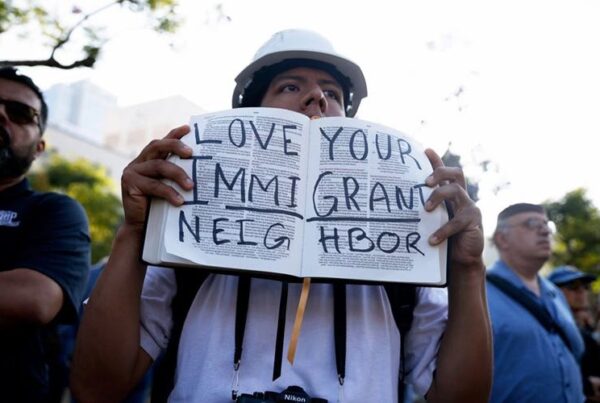The Chasing Justice team walked among colorful children’s drawings, stuffed animals, full backpacks and other items left behind at the border between Ciudad Juarez, Mexico and El Paso, Texas. In silence, we contemplated the sacred losses and longings felt by the multitudes of people who have stopped here.
Then, to our surprise, we heard the bright cackles of nearby laughter. A few feet away, Elvira Garcia and her three friends exchanged excitement as they planned their high school reunion, nearly 50 years after graduation.
Immigrant Made is a Chasing Justice series that focuses on mutuality with migrants by elevating the stories of immigrants and the generations that follow. In October 2023, Chasing Justice participated in an immersive border encounter with Abara, a nonprofit organization that builds connections through education and partnerships at the Juarez-El Paso border.
Since then, we’ve seen Texas’ attempt to pass SB4, a law that would allow Texas police to arrest people they suspect of crossing the border illegally, which set off the creation of similar bills in Arizona and Iowa.
As we seek to live justly, it’s important to not only be informed of potential policies in our world but also to be connected to the people who are most impacted. We interviewed Elvira Garcia (68) and some of her friends at the border.
Garcia (pictured below) talks about growing up in El Paso, Texas with connections on both sides of the border:

Chasing Justice: What was it like growing up in El Paso?
Elvira Garcia: It was good because my grandparents were from Mexico, right across in Juarez. So, we got the chance to see them all the time. Living here during the week, weekends in Juarez.
CJ: What were weekends like in Juarez?
EG: Oh, they were the best! You can just play with everybody until all hours of the night. And back then, it was really nice because it was safe. Kids could be out walking in the night. When it was time to eat or whenever, they would send you to the bakery, or store, or whatever, and you could go by yourself at whatever age.
CJ: You talked about going back and forth freely from El Paso to Juarez. What has been your experience seeing the changes in immigration policies in the U.S. from El Paso?
EG: I never had any problems because being educated and schooled here, we knew both languages. Back then, you didn’t even need a passport. You didn’t need anything. You didn’t need an I.D. It was American and that was it.
This is part one of a three-part series that includes interviews with three elders who grew up near the U.S.-Mexico border between El Paso, Texas and Ciudad Juarez, Mexico. Check out the other interviews with Salvador Salsierra and Carmen Velia Estrada.
The views and opinions expressed on the Chasing Justice Blog are those of the authors and do not necessarily reflect the official policy or position of Chasing Justice. Any content provided by our bloggers or authors are of their opinion and are not intended to malign any religion, ethnic group, club, organization, company, individual or anyone or anything.








